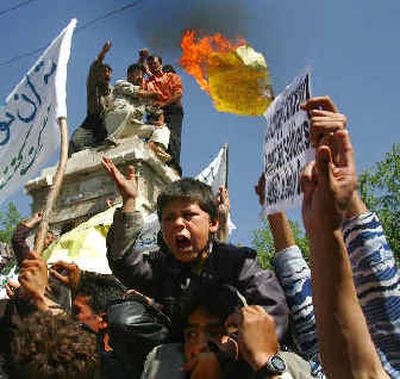Protests spread to Pakistan

KABUL, Afghanistan – Afghans enraged by the alleged desecration of Islam’s holy book at a U.S. prison staged a third day of violent protests Thursday, burning an American flag in the capital and ransacking relief group offices to the south as demonstrations spread to neighboring Pakistan.
Secretary of State Condoleezza Rice promised “appropriate action” would be taken if the allegations are proven true, while key U.S. ally Saudi Arabia urged that any offenders be quickly disciplined.
Three more demonstrators were shot and killed in clashes with police, officials said, bringing the death toll to at least seven in the biggest anti-American protests in Afghanistan since the fall of the Taliban in 2001 – and presenting a fresh challenge to efforts to stabilize the country.
While most of the protesters were students, officials suggested that elements opposed to Afghanistan’s U.S.-backed government were stirring the violence, which has also targeted American troops and the United Nations.
The demonstrations could complicate President Hamid Karzai’s plans to ask for military aid on a trip to Washington this month, a prospect that has stoked a previously muted debate on how long U.S. troops should stay to secure the country, still riven by a Taliban-led rebellion. That debate may play out in parliamentary elections this year.
The Afghan leader, on a trip to Europe, has played down the violence as the growing pains of Afghan democracy.
The trigger of the unrest was a brief report in the May 9 edition of Newsweek magazine that interrogators at the U.S. prison on Guantanamo Bay, Cuba, placed Qurans in washrooms to unsettle suspects, and in one case “flushed a holy book down the toilet.”
Desecration of the Quran is punishable by death in both Afghanistan and Pakistan, but diplomats and officials have been taken aback by the intense reaction – further enflamed by bloodshed in a police crackdown on anti-U.S. protesters in the eastern Afghan city of Jalalabad on Wednesday that left four dead and over 70 wounded.
It was unclear why demonstrations broke out this week and not after previous media reports. In July 2004, for example, the Arab station Al-Jazeera ran an interview with a former Guantanamo detainee who claimed he saw a U.S. soldier stomp on the Quran and that another American soldier in the southern city of Kandahar threw a holy book into the toilet.
Pakistan protested to the U.S. government last weekend about the alleged abuse cited in the Newsweek report, giving the article wider play in the region’s media than the Al-Jazeera interview may have received last year.
At the Pentagon, Gen. Richard Myers, chairman of the Joint Chiefs of Staff, said Thursday that U.S. commanders in Afghanistan believe that local political factions – and not the reports about the alleged desecration – are driving the violence in Jalalabad.